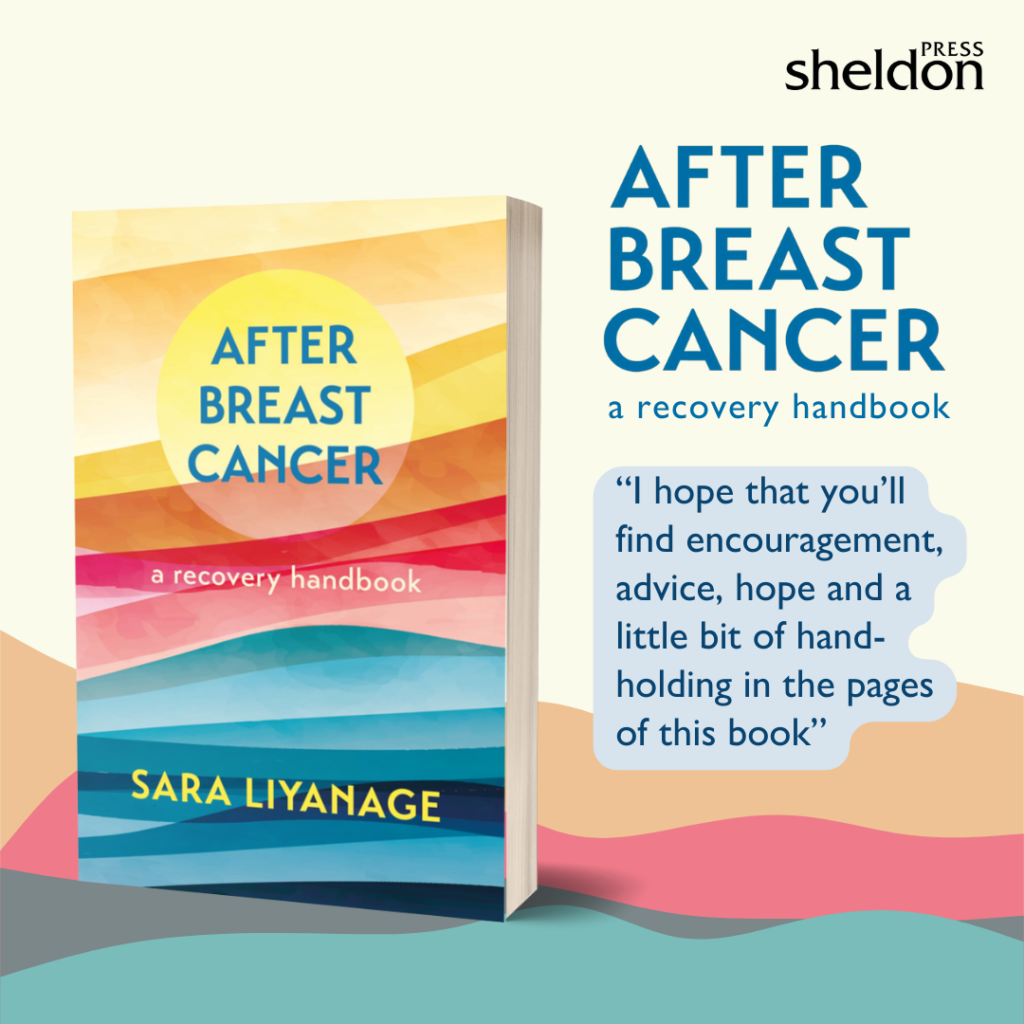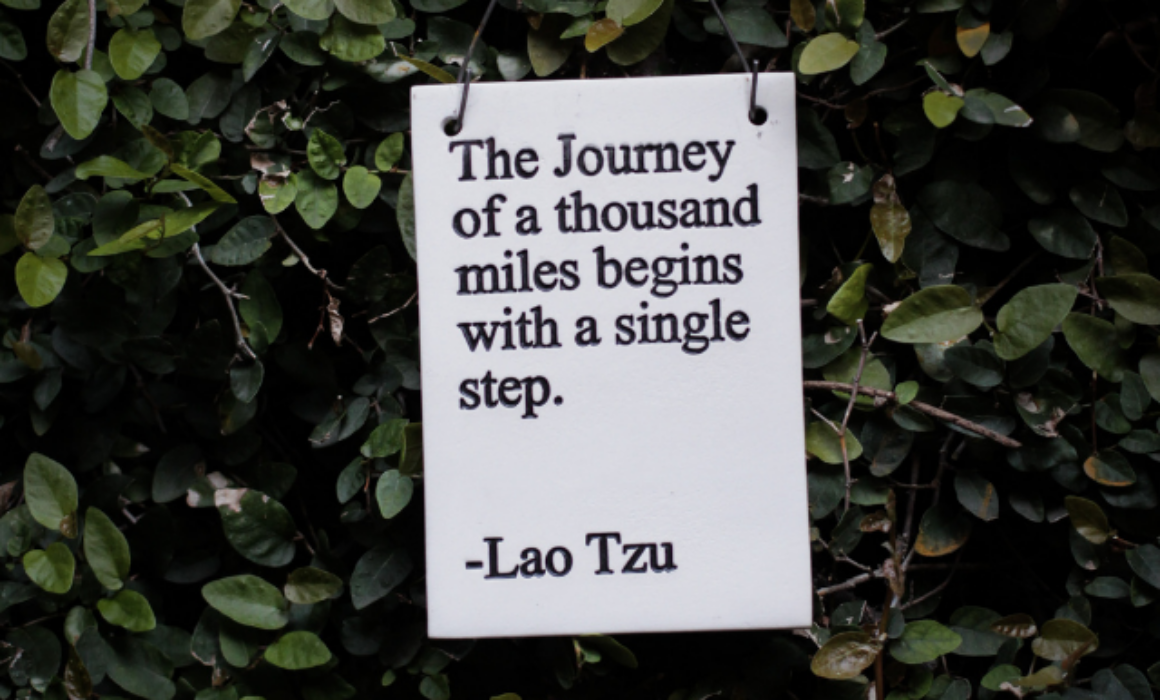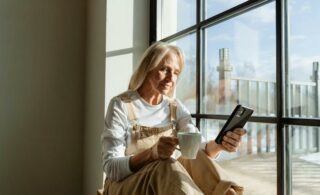
Whatever, “life after cancer” means to you, the chances are that you will need some help or advice at some point along the way. So, what advice is there? In this section we list all the resources that we’ve come across which can help you to live your life after cancer. This is your starting point. And if you ever feel overwhelmed, scared or unhappy please please please seek professional advice. It is ok to feel like that, but there are lots of places that can provide professional help. We’ve produced this from our perspectives as patients so please refer any personal issues to your medical team.
Life after finishing breast cancer treatment will be different for everyone. For some people it will mark a return to normalcy; back to living their life exactly as it was pre-cancer. For others, there is no “back to normal” but more of a finding the new normal and moving on from there. Most of us fall somewhere between the two: we fall back into some of the old ways of life with the recognition that it isn’t the same and that some aspects of life are, and will continue to be, different post-cancer.
There are practical aspects to life after cancer where you may need some help. Things like: going back to work, getting more exercise, living a healthy lifestyle, awareness of the risk of recurrence and secondary breast cancer, dealing with menopausal symptoms, insomnia, physical issues caused by the cancer treatment, dealing with fatigue, dealing with chemo brain, financial issues, and the list goes on.
There are also the emotional issues to life after cancer. Having been through an incredibly traumatic experience it is unlikely that you will walk away from cancer unscathed. Things like the fear of recurrence and secondary breast cancer, general anxiety, feeling unable to cope, being scared now you no longer need to go hospital regularly, friendship issues, family relationship issues, feeling guilty, going for annual check-ups…The list is pretty long.
If you’re looking for more support, Future Dreams hold a range of support groups, classes, workshops and events to help you and your carers both during and after your breast cancer treatment. These are held both online and in person at the London-based Future Dreams House. To see what’s on offer and to book your place, see here.
Book recommendation

After Breast Cancer: A Recovery Manual by Sara Liyanage
GOING BACK TO WORK
EXERCISE
There is so much available to help you to exercise after your cancer treatment. Just go for a walk, go swimming at the local pool, ride a bike or join the local gym. Don’t be scared. Just start slowly and build up. The main thing is to make sure that you get some exercise every day.
Other helpful places to look for information about exercising are:
If you are in need of motivation then you could aim to participate in one of the charity fundraising events like the Cancer Research UK race for life, or a Macmillan trek, or the moonlight walk through London (there are loads more – just visit the charity websites).
Breast Cancer Now advice on exercise.
Other websites to look at include:
Park Run organise free weekly 5k events around the world.
Trekstock runs an exercise programme call Renew for young adults
HEALTHY LIFESTYLE
NUTRITION
Beware of what you read online about eating to prevent cancer recurring. There are a lot of people out there who are either trying to sell cancer-preventing supplements or push a cancer-prevention diet. Some of these are not scientifically backed up, and some are just rubbish. Always choose your advice from one of the reputable cancer charities or organisations. Some helpful advice on eating well after cancer can be found here:
Bupa – from the home page search for their article entitled “Eating well during and after cancer”
The Urban Kitchen – Toral Shah’s website has nutritional advice – check out her blog for interesting articles and recipes.
RISK OF RECURRENCE
Don’t forget to always see your GP, oncologist or breast surgeon if you are worried about anything. And if you are having problems with the anxiety about recurrence then perhaps seek professional help such as counselling or CBT.
Breast Cancer Now advice.
Cancer Research UK on why some cancers come back.
RISK OF SECONDARY BREAST CANCER
You may, or may not, be told by your oncologist or breast surgeon about secondary breast cancer when you go for your annual check up. It is important to be aware of the risks and signs so consider asking if they do not broach the subject.
Make Seconds Counts infographic and advice about the sites of secondary breast cancer is very helpful.
Our website has some useful advice about key points about secondary breast cancer and what to ask your oncologist about secondary cancer after primary breast cancer treatment.
PHYSICAL ISSUES CAUSED BY TREATMENT (INC. CHEMO BRAIN AND FATIGUE & MENOPAUSE)
CHEMO BRAIN
There are a lot of articles online which give advice on dealing with chemo brain, memory loss and brain fog which lingers around after the end of chemo. they generally provide suggestions along the lines of:
- getting enough rest and sleep
- doing puzzles and brain games to use your brain
- keep to a daily routine
- write things down
- exercise
Macmillan advice on chemo brain
FATIGUE
Macmillan has advice on fatigue and tiredness as a result of cancer treatment
Breast Cancer Now has advice on coping with fatigue
INSOMNIA
Insomnia after cancer treatment is common and it can be due to a variety of things such as: anxiety about recurrence, general anxiety and menopausal symptoms such a night sweats.
One way in which you can help this is to practice some relaxation techniques and the advice found on the relaxation section of this website is as relevant after treatment as during.
Macmillan advice
Cancercare advice
LYMPHOEDEMA (AND SEE THE LYMPHOEDEMA PAGE)
The Lymphoedema Support Network is “a registered charity run by people who live with lymphoedema and is the largest information provider about the condition in the UK. This website forms part of our work and contains information for patients about the condition and the experience of living with lymphoedema as well as information for health care professionals looking to support patients with lymphoedema.”
See our Q&A about lymphoedema from a physiotherapist that provides answers to some of the questions you may have.
MENOPAUSE
Do speak to your GP about your menopausal symptoms. In the meantime, there are plenty of helpful websites to take a look at:
Menopause Matters is a website providing up-to-date information about the menopause, menopausal symptoms and treatment options. It is not breast cancer related. It may give you some information on how to manage your symptoms.
Menopause Support “Diane is a Psychotherapist, Menopause Expert and Wellbeing Consultant who specialises in working privately with women and couples guiding and supporting them through menopause, midlife and beyond. She also provides bespoke menopause training and support solutions for businesses and organisations and menopause training for therapists.”
Positive Pause is a website (non cancer related) which says is there “to share positive, supportive and constructive advice about all things midlife, menopause & beyond!”
Check out our page on the menopause for helpful articles.
FRIENDSHIP AND FAMILY RELATIONSHIP ISSUES
It is so common for you to find that during and after breast cancer treatment, there is a shift in some of your relationships – family members, partners and friends. Sometimes, people who you thought would be there for you during and after treatment, are in fact not around. This can be incredibly difficult to deal with. You are not alone in feeling this way – most people find themselves in this situation. It is not very nice and can take a bit of time to get your head around and work out how to move forward with these relationships. You may find the following information helpful:
See our articles on:
How to make sense of your friendships after cancer
FINANCIAL ISSUES
Maggie’s and Macmillan both offer help with financial issues. Maggie’s has advisors in many of its centres with details on its website. Macmillan has a financial help section on its website and provides access to financial experts.
DEALING WITH EMOTIONAL ISSUES SUCH AS ANXIETY, FEAR AND GUILT
Mindful – is a website which provides lots of advice about mindfulness and meditation. One worth visiting if you are interested in trying to incorporate mindfulness or meditation into your everyday life and are in need of some tips and advice.
The Mayo Clinic article: Cancer survivors: Managing your emotions after cancer treatment
How to rebuild your confidence after cancer
COUNSELLING
If you are struggling with one or more of these issues do not feel embarrassed/afraid/guilty to seek counselling. Counselling for breast cancer survivors can be accessed from many different places including Future Dreams. Maggie’s also provide counselling services and their website also has information about managing emotions. Also ask your local cancer support centre about services they provide.
SIGNING OFF FROM BREAST CANCER TREATMENT & FOLLOW UPS
How you are signed off from the treatment you have had for breast cancer and how you are followed up depends on the process in place at your hospital. In England and Wales, there is a process called “Open Access Follow up” which has been introduced in many NHS hospitals.
There is a useful Podcast on “Open Access Follow up” on the My Breast My Health website.
GENERAL RESOURCES TO HELP YOU MOVE ON AFTER CANCER
Mission-Remission – a website which provides an “interactive platform to share experiences, signpost to relevant services, and advise on practical strategies that help. Through peer support and direct access to research & support services, we aim to make cancer survival less isolating and more empowering, focusing on the positive message that you can feel better after cancer.”
I had cancer – a US-based website which provides advice for living life after cancer by way of many articles written by cancer survivors, a forum to chat with other survivors plus lots and lots of tips and advice.
Life After Cancer – is a London based organisation which “offers a gentle, safe space for you to explore what your life after cancer looks like. We offer individual support through one-to-one coaching, group workshops and support groups, helping you to get from where you are now, to where you want to be. Our spaces are created by trained coaches, all whom have experienced their own personal cancer journey.” Some services are free whilst others incur a charge. Their online hub is full of helpful information to help you love forward after cancer.
Future Dreams charity puts on a variety of post-treatment workshops and events. Check out the bookings page here.
Lots of the big charities and local cancer hospices put on courses to help you move forward after finishing your cancer treatment. Take a look at the following links to courses:
- Penny Brohn UK
- Maggies put on a “Where Now?” course
- Breast Cancer Now
- Macmillan put on a “HOPE” course at various cancer support centres around the country.
The Younger Breast Cancer Network (YBCN) on Facebook (for women based in the UK under the age of 45) has a special ‘moving on’ group that you can join when you finish treatment. Within this (closed, private) group you can chat to other women who are in exactly the same position as you. It is a place to air concerns, worries, questions whilst also providing others with support and sharing stories.
Return to Wellness – Barbara is a health & wellness coach, facilitator, researcher and adult learning specialist. Her passion is supporting people to manage effectively the emotional impact of a serious health issue, rediscover their purpose and move on with their lives in the way they wish to.
Happy Box From Me to You “The Happy Box is filled with letters of love, kindness and smiles donated by writers from around the world, all hoping to brighten your day. You can dip in to take a letter whenever you need a boost.”
Wigwam – according to its website: “Wigwam cancer support groups provide a space where people can come together and share what they are learning about lifestyle changes that support their health and wellbeing and to receive support and inspiration from others.”
ARTICLES OF INTEREST
An article for Mission Remission about that period immediately after treatment ends, but before you are able to move on from cancer.
An article for Breast Cancer Now about moving on from breast cancer.
To return to the homepage of our Information Hub, click here where you can access more helpful information, practical advice, personal stories and more.
Reviewed April 2024
We’ve put this list of recommendations together from our experience as patients but we encourage to use these as a starting point from which to do your own research. The links and/or recommendations in this article to third-party resources are for your information and we take no responsibility for the content contained in those third-party resources. Any product recommendations made in this article are not product endorsements and unless otherwise stated, they are made without any affiliation to the brand of that product. We ask you to note that there may be other similar products available.
Share

Support awareness research
Donate to those touched by BREAST cancer
Sylvie and Danielle began Future Dreams with just £100 in 2008. They believed nobody should face breast cancer alone. Their legacy lives on in Future Dreams House. We couldn’t continue to fund support services for those touched by breast cancer, raise awareness of breast cancer and promote early diagnosis and advance research into secondary breast cancer without your help. Please consider partnering with us or making a donation.



